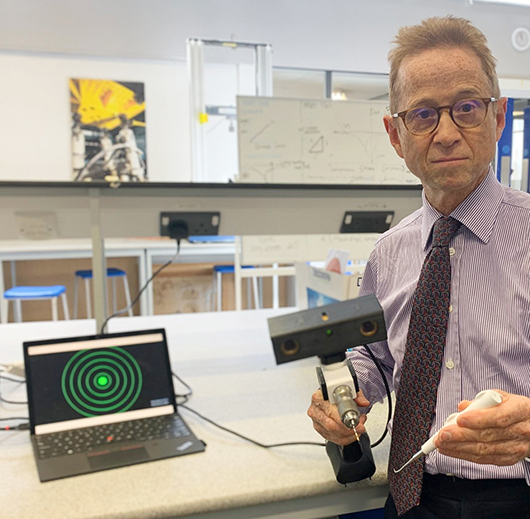Media Release
Date: 1 October 2024
New medical device used for first time during patient surgery
A ground-breaking new medical device which improves the accuracy of drilling screw holes into bones during surgery has been used on a patient for the first time during surgery at the Royal United Hospitals Bath NHS Foundation Trust.

The drill guidance system (DGS), which has been developed in collaboration with the University of Bath, helps surgeons to be even more accurate when drilling the holes and reduce the time patients spend in the operating theatre.
When fixing a break in the bone, the surgeon will normally use just their eyesight and x-rays when directing the drill to make the hole in the bone for a screw.
Using the drill guidance system, the surgeon uses all the same techniques but with the addition of a camera on the drill and an indicator which helps them guide the drill in the correct direction as it passes through the bone.
The increased accuracy the DGS provides helps to reduce the number of x-rays a patient needs as well as enabling a single-attempt approach to drilling, reducing bone and soft-tissue damage, and chances of infection.
Since it was introduced, the DGS has been used in operations on wrists, arms, knees and ankles as a result of both trauma and planned surgery. It is hoped that the device will be used in even more operations in the future.
The project at the RUH is being led by Professor Grey Giddins, a Consultant Orthopaedic and Hand surgeon, with support from Dr Ioannis Georgilas, of the University of Bath’s Department of Mechanical Engineering, and support from the National Institute for Health and Care Research (NIHR).
Prof Giddins said: “The use of the drill guidance system for the first time during surgery is fantastic news and really will improve the experiences of the people we care for, reducing the amount of time they spend in surgery as well as reducing the chances of infection.
“I would like to acknowledge the hard work of the research team at the RUH and everyone involved in the project at the University of Bath for their vital support.”
Dr Ioannis Georgilas said: “The development and successful clinical implementation of the Drill Guidance System represents a significant advancement in medical device development.
“This achievement underscores the efforts and expertise of the research teams at both the RUH and the University of Bath. We are proud of the collaboration that has brought this innovative solution to fruition, enhancing surgical precision and patient care.”
The use of the DGS in the first patient operation follows extensive research at the RUH and certification from the Medicines and Healthcare products Regulatory Agency (MHRA), which is responsible for regulating the UK medical devices market.
ENDS

